Unit 1 Favourite Teachers Grammar 课件(69张PPT)
文档属性
| 名称 | Unit 1 Favourite Teachers Grammar 课件(69张PPT) |
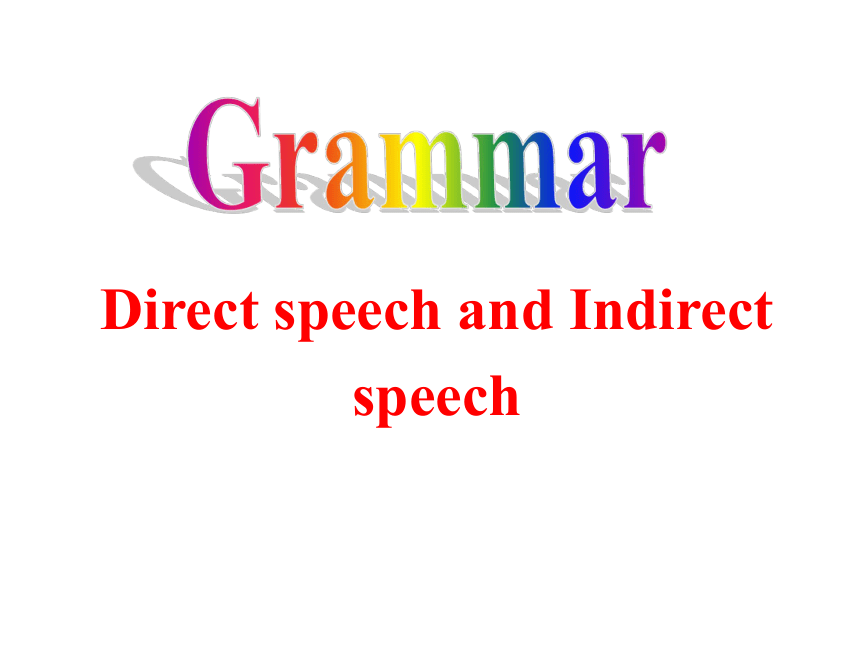
|
|
| 格式 | zip | ||
| 文件大小 | 1.6MB | ||
| 资源类型 | 教案 | ||
| 版本资源 | 重庆大学版 | ||
| 科目 | 英语 | ||
| 更新时间 | 2019-07-07 00:00:00 | ||
图片预览

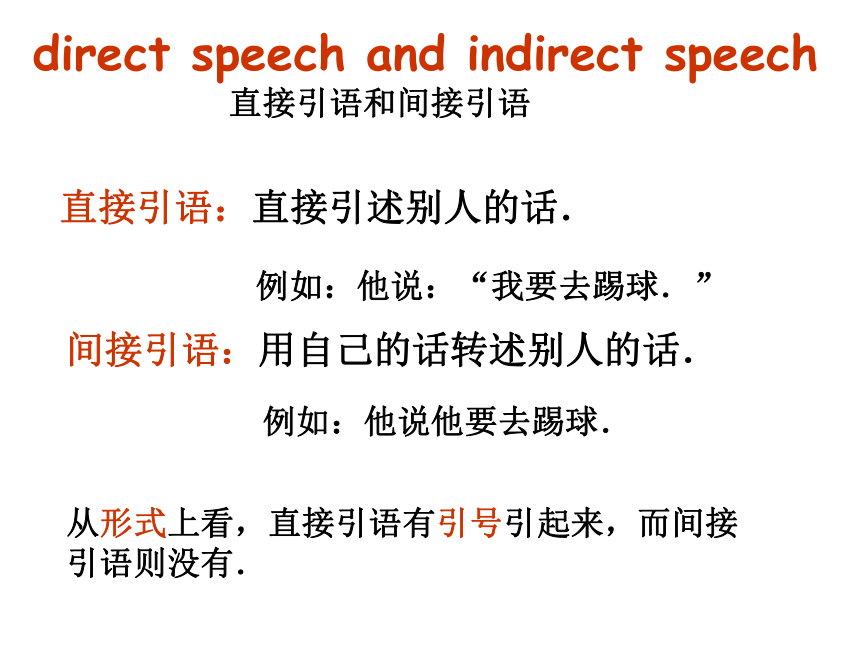
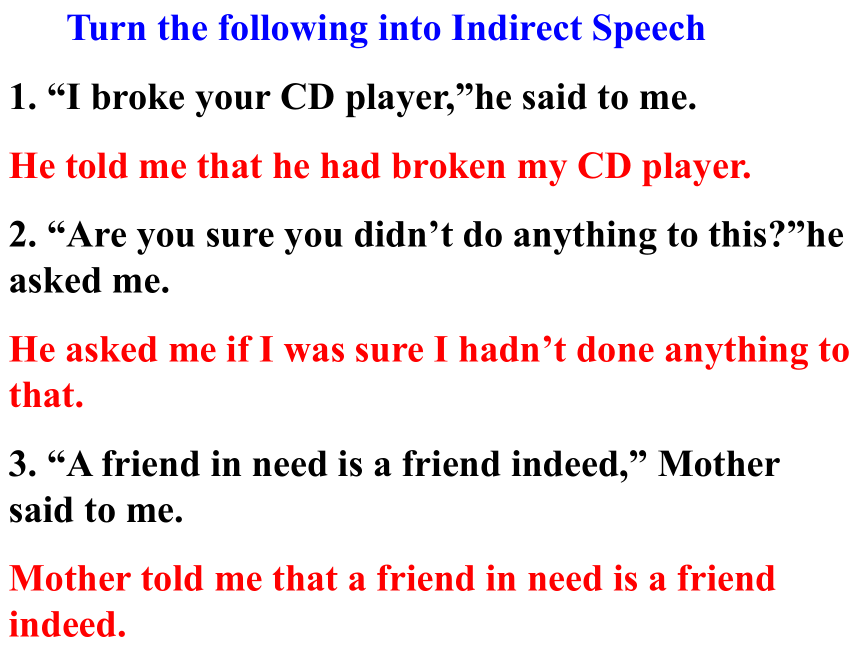
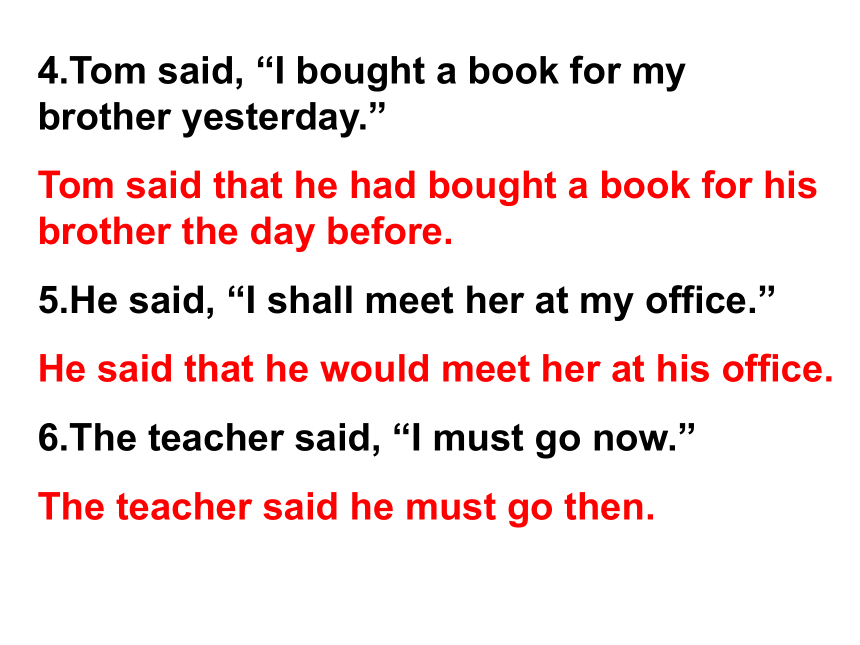
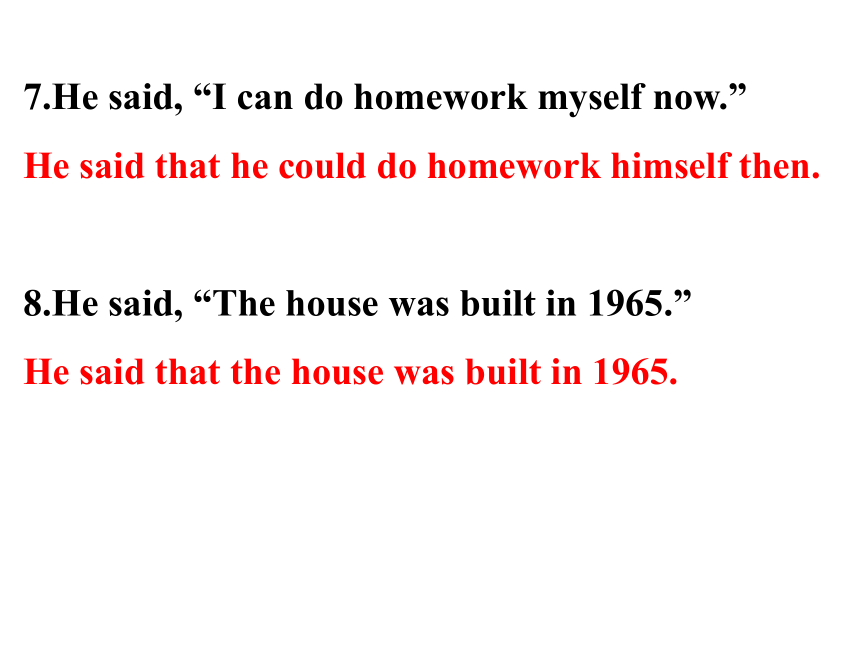
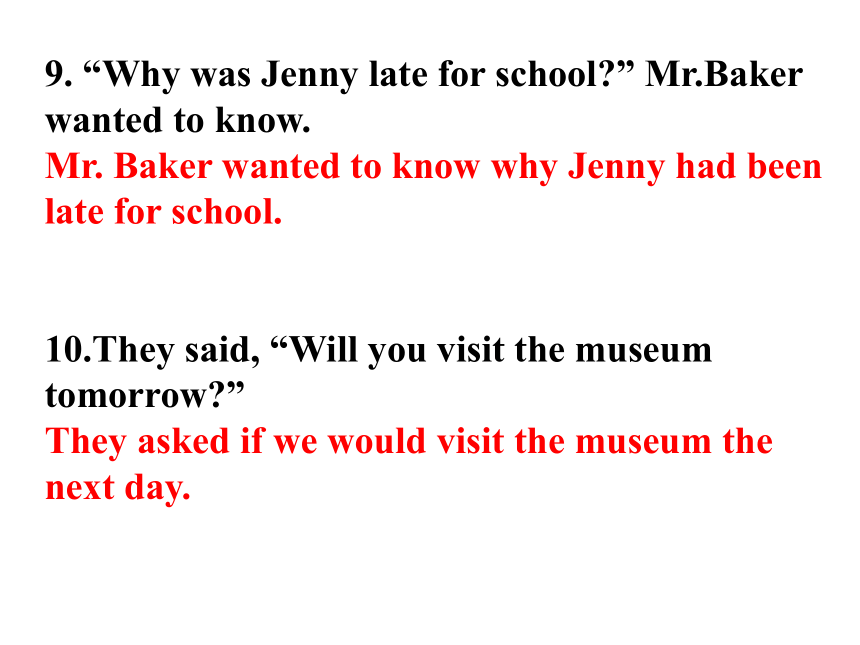
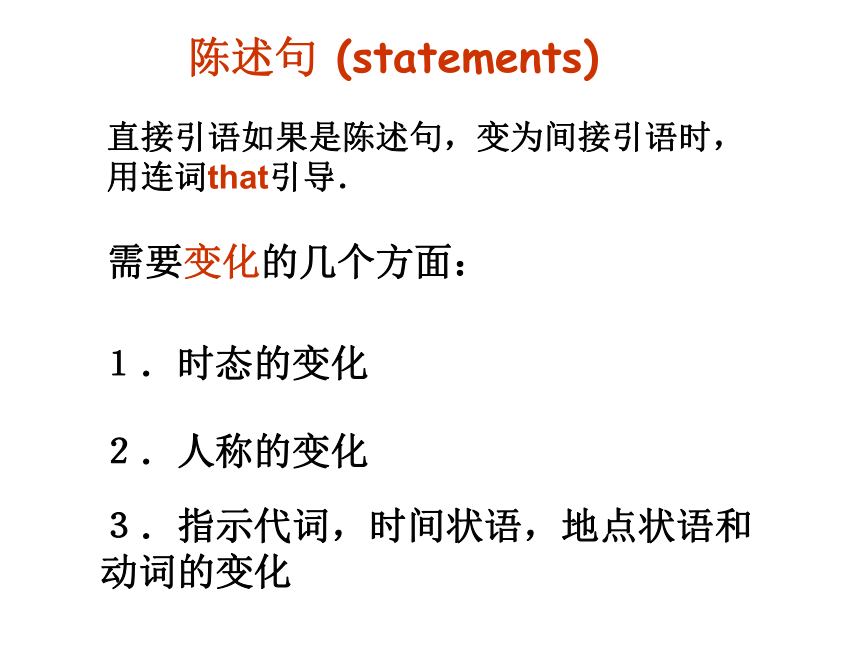
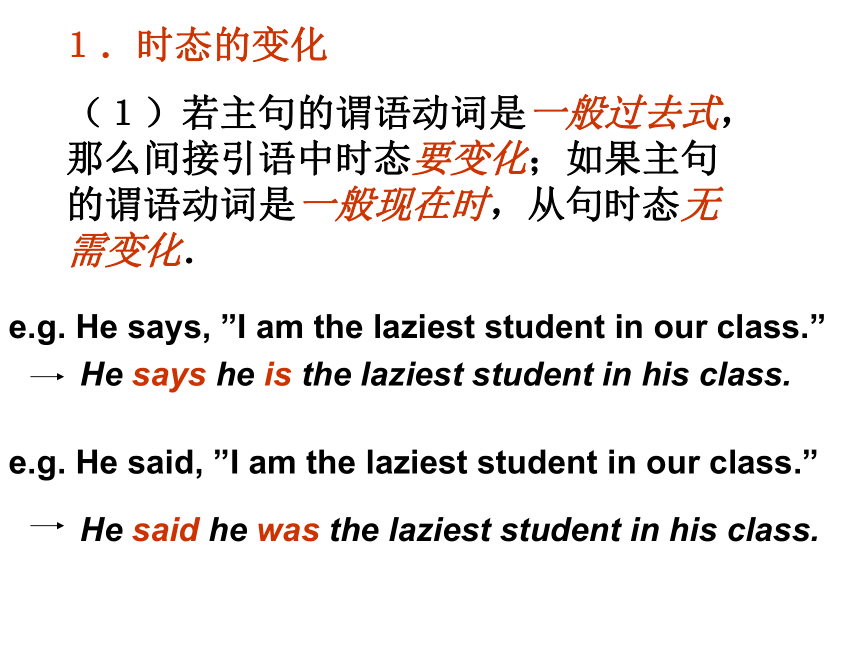
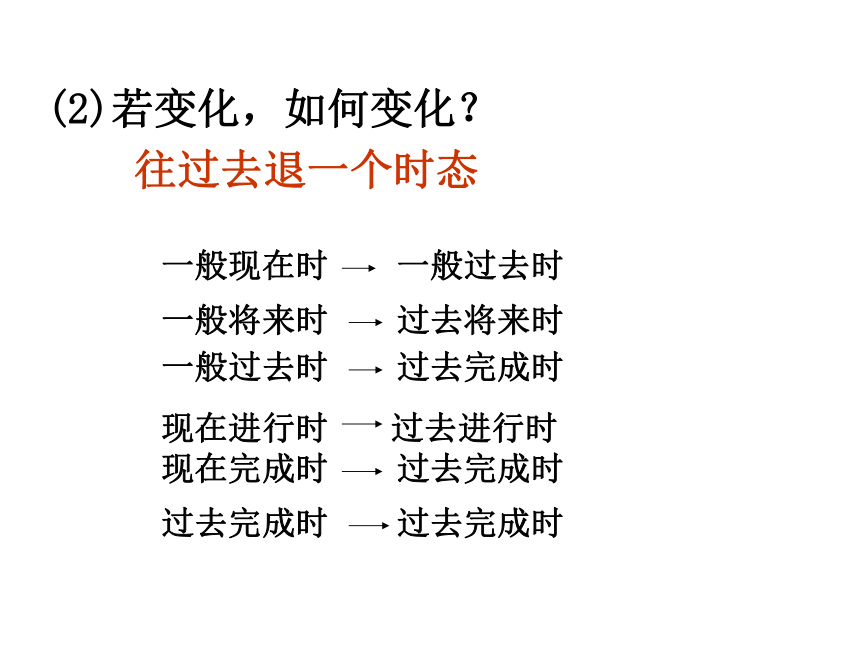
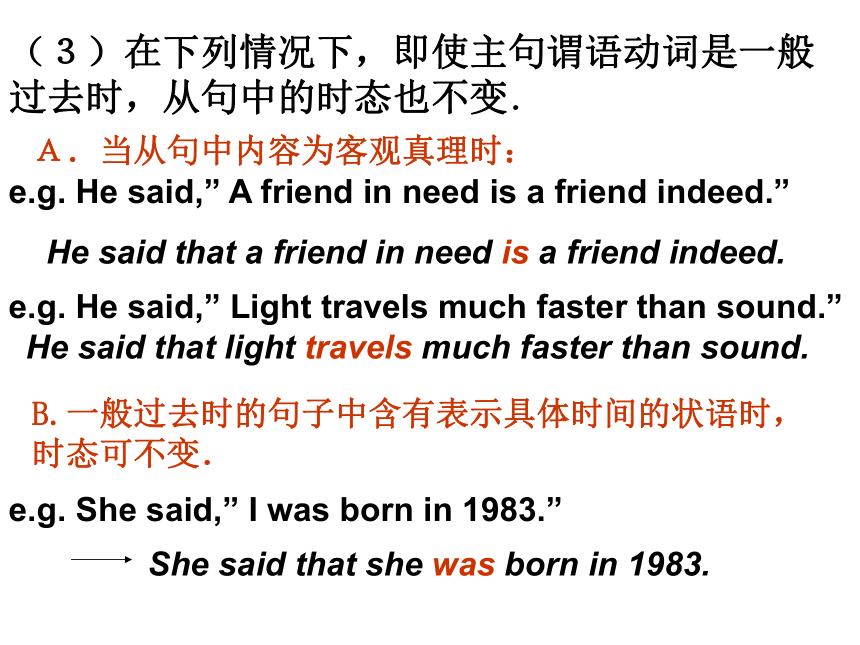
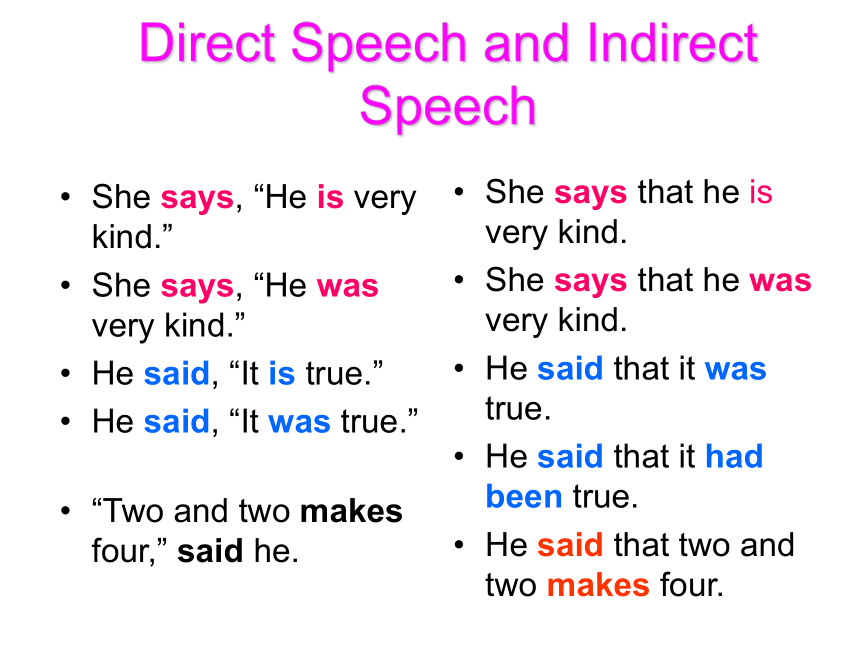

文档简介
课件69张PPT。GrammarDirect speech and Indirect speechdirect speech and indirect speech直接引语和间接引语直接引语:直接引述别人的话.例如:他说:“我要去踢球.”间接引语:用自己的话转述别人的话.例如:他说他要去踢球.从形式上看,直接引语有引号引起来,而间接引语则没有. Turn the following into Indirect Speech
1. “I broke your CD player,”he said to me.
He told me that he had broken my CD player.
2. “Are you sure you didn’t do anything to this?”he asked me.
He asked me if I was sure I hadn’t done anything to that.
3. “A friend in need is a friend indeed,” Mother said to me.
Mother told me that a friend in need is a friend indeed.4.Tom said, “I bought a book for my brother yesterday.”
Tom said that he had bought a book for his brother the day before.
5.He said, “I shall meet her at my office.”
He said that he would meet her at his office.
6.The teacher said, “I must go now.”
The teacher said he must go then.
7.He said, “I can do homework myself now.”
He said that he could do homework himself then.
8.He said, “The house was built in 1965.”
He said that the house was built in 1965.
9. “Why was Jenny late for school?” Mr.Baker wanted to know.
Mr. Baker wanted to know why Jenny had been late for school.
10.They said, “Will you visit the museum tomorrow?”
They asked if we would visit the museum the next day. 陈述句 (statements)直接引语如果是陈述句,变为间接引语时,用连词that引导.需要变化的几个方面:1.时态的变化2.人称的变化3.指示代词,时间状语,地点状语和动词的变化1.时态的变化(1)若主句的谓语动词是一般过去式,那么间接引语中时态要变化;如果主句的谓语动词是一般现在时,从句时态无需变化.e.g. He says, ”I am the laziest student in our class.”e.g. He said, ”I am the laziest student in our class.”He says he is the laziest student in his class.He said he was the laziest student in his class.(2)若变化,如何变化?往过去退一个时态一般现在时 一般过去时一般将来时 过去将来时一般过去时 过去完成时现在进行时 过去进行时现在完成时 过去完成时过去完成时 过去完成时(3)在下列情况下,即使主句谓语动词是一般过去时,从句中的时态也不变.A.当从句中内容为客观真理时:e.g. He said,” A friend in need is a friend indeed.”He said that a friend in need is a friend indeed.e.g. He said,” Light travels much faster than sound.”He said that light travels much faster than sound.B.一般过去时的句子中含有表示具体时间的状语时,时态可不变.e.g. She said,” I was born in 1983.”She said that she was born in 1983.Direct Speech and Indirect SpeechShe says, “He is very kind.”
She says, “He was very kind.”
He said, “It is true.”
He said, “It was true.”
“Two and two makes four,” said he.She says that he is very kind.
She says that he was very kind.
He said that it was true.
He said that it had been true.
He said that two and two makes four.2. 人称的变化3.指示代词,时间状语,地点状语和动词的变化this---thatthese-thosenow- thentoday-that dayyesterday-the day beforetomorrow-the next daynext-the nextago-beforehere- therecome-goComplete the following chart according to your understanding of indirect speech. thenyesterdaythe next daythat daylast nightheretwo days beforethat placethese placesgobring Direct Speech and Indirect SpeechHe said, “I’m happy.”
She said to me, “I met your father.”
You said to him, “We saw you there.”
He said to Tom, “We have made a mistake.”He said that he was happy.
She told me that she had met my father.
You told him that you had seen him there.
He told Tom that they had made a mistake.They said, “We are going to see him now.”
She said, “I will go tomorrow.”
He said to me, “I do it yesterday.”
He said to me, “I came back an hour ago.”They said that they were going to see him then.
She said that she would go tomorrow/the next day.
He told me that did it yesterday/the day before.
He told me that he had come back an hour before.Practise makes perfect!疑问句 (questions)1. 不管是何种疑问句,改成间接引语时必须用陈述句的语序,句末用句号.2.一般疑问句:连词要用if 或者whether ,谓语动词said 要改为asked.3.特殊疑问句:仍用原来的疑问词引导.1. The teacher asked me, “Do you like English?”
→ The teacher asked me if I liked English.
2. He asked, “You’ve already finished your homework, haven’t you?”
→He asked if/whether we had already finished our homework.直接引语为一般疑问句、反意疑问句或选择疑问句,可以改成以if / whether + 陈述句的形式。引语为特殊疑问句时,保留疑
问词,后跟陈述句。1. He asked me, “Where are you going?”
→He asked me where I was going.
2. She asked him, “Whom do you want to
see?”
→She asked him whom he wanted to see.I said to him, “Who is she?”
He asked me, “What do you want?”
He said, “Are you ready?”
“Do you think it is right?” said he.I asked him who she was.
He asked me what I wanted.
He asked if I was ready.
He asked if I thought it was right. Direct Speech and Indirect Speech祈使句(imperatives)Keep quiet. Help me with my homework. Take off your shoes. Tell me your true feelings. Please keep quiet.Could you please help me with my homework?Can you take off your shoes?Will you tell me your true feelings?commandsrequeststell/order sb to do sthask sb to do sth练习:1. The teacher said to the student, “Don’t
be late again.”
→The teacher told the student not to be
late again.
2. “Wake him up,” she said to me.
→ She told me to wake him up.GRAMMAR 第二课
复习与练习直接引语变间接引语及其注意事项三大变化:
人称代词,时间状语等的变化
时态变化
句型变化1. He said, “I had finished my homework
before supper.”
He said that _____had finished _____ homework before supper.2.She said to me, “I met your father.”She told me that _____had met ______ father.3.He asked me, “What do you want?”
4.He said, “Are you ready?”He asked if ____ was ready.人称变化He asked me what _____wanted.
hehisshemyI I 指示代词、时间与地点状语的变化
指示代词 this these
表示时间的词
now today
yesterday
tomorrow
next week /month/year
last night
three days ago
表示地点的词
here -that-those-then-that day-the day before-the next day-the next week/month/year-the night before-three days before-there直接引语与间接引语的时态变化 时态的变化
1. He said, “I am not your friend.”
He said that he was not my friend.
2. He said, “ I am using the knife.”
He said that he was using the knife.
3. She said, “I have lived in Beijing since 1950.”
She said that she had lived in Beijing since 1950. 4. She said, “Your younger brother broke it.”
She said that my younger brother had broken it.
.
5. He said, “ I will do it after class.”
He said that he would do it after class.
6. He said, “ I have finished my homework before
supper.”
He said that he had finished his homework
before supper.1.直接引语为陈述句,变为由that 引导的宾语从句(that 常可省略)
Mother said to Mary, “You can watch TV when you finish your homework.”
Mother told Mary (that) she could watch TV when she finished her homework.
She said to me, “I like English very much.”
She said to me (that) she liked English very much. 2直接引语为 一般疑问句变为间接引语时,变为由whether/if引导的宾语从句, whether/if之前多用ask等动词。词序也一律变为陈述的语序。例如:
He asked me, “Do you know John?”
He asked me whether I knew John.
The teacher asked me, “Do you like English?”
The teacher asked me if I liked English. 3直接引语为 特殊疑问句变为间接引语时,变为由特殊疑问词 引导的宾语从句,特殊疑问词之前多用ask等动词,词序也变 为陈述语序。例如:
He said, “Where have you been?”
He asked me where I had been.
“How many pages have you read today?” John
asked me.
John asked me how many pages I had read that
day.
Betty asked, “When are you going to meet Joe?”
Betty asked when I was going to meet Joe.4.直接引语为祈使句时,变成间接引语 变为:
tell/order sb (not)to do(命令)
ask sb. (not) to do sth(请求)1) The teacher said: “Don't shout in the classroom.”
2) The teacher said: “Can you help Mary with her
English?”The teacher told us/me not to shout in the classroom.
The teacher ask me to help Mary with her English.
( ) 3) Could you please join Group One?
( ) 4) Can you tell me how to spell that word?
( ) 5) Don't throw the exercise book to Anna.
RRCThe teacher asked me/us to join group One.The teacher asked me to tell her/him how to spell that word.The teacher told me not to throw the exercise book to Anna.Follow me.Where is the temple?Baobao told him to follow him.Beibei asked where the temple was.Don’t cry.Where is mum?The girl told him not to cry.The boy asked where his mother was.1. “We won’t be free tonight,” the students said.
2. “I am expecting a letter from my mother,”
Betty said.
3. He said, “My sister was here three days ago.”The students said that they wouldn’t be free that night.Betty said that she was expecting a letter from her mother.He said that his sister had been there three
days before.4. Mike asked me, “When will the plane
land?”
5. He asked, “Where has Li Ming gone?”Mike asked me when the plane would land.He asked where Li Ming had gone.6. Sara asked, “Will you come to the lecture
this afternoon?”
7. The teacher asked, “Did you watch TV
yesterday?” Sara asked if I would go to the lecture that afternoon.The teacher asked if I / we had watched TV the day before.The teacher said,“Don’t be late, Mary. ”
The teacher told ____.
? A. Mary not to be late
B. Mary to be not late??????
C. Mary are not late?? D. not to be late
2. He asked her,“Where are you going?”
He asked her ____.
A. where she were going????
B. where she was going to
C. where she was going??
D. where she is goingACExercise3. The lady said, “I will get there on time. ”
The lady said that ____.
????A. she would come there on time????
B. she would come here on time
????C. she would got here on time????
D. he would got here on time
4. He said to me, “I wrote to my father
yesterday. ”
He told me he had written to his father ____.
???A. the yesterday???? B. before today????????
C. the day before D. the next dayBC5. The teacher asked,“Are you waiting for the
bus?”
The teacher asked ____ for the bus.
????A. if I was waiting?? B. was I waiting
C. you are waiting???????? D. I was waiting
6. The professor said that light ____ faster than
sound.
????A. travels???? B. traveled????????
C. travel D. traveledAA7. My mother asked me to show my homework
to her.
My mother said to me, “Show ____
homework.”
????A. her my?????????? B. me your????????
C. her your??????? ? D. me his
8. It’s hard for me to imagine what I would be
doing today if I ______ in love at the age of
seven, with the Melinda Cox Library in my
hometown.
A. wouldn’t have fallen B. had not fallen
C. should fall D. were to fallBB9. I wonder how he ____ that to the teacher.
A. dare to say B. dare saying
C. not dare say D. dared to say
10. He asked, “ How much do you pay for the computer?”
→ He asked _____ for the computer.
A. did you pay how much
B. you paid how much
C. how much did I pay D. how much I paidDD11. “Have you seen the film?” he asked me.
→He asked me ______. A. had I seen the film
B. have I seen the film C. if I have seen the film
D. whether I had seen the film
12. “Please close the window,” he said to me.? →He ____ me ____ the window. A. said to; to close B. told to; closing C. asked; to close D. said to; please closeDC1. He asked ________ for the computer.
A. did I pay how much
B. I paid how much
C. how much did I pay
D. how much I paid课外练习2. “Have you seen the film?” he asked me.
→He asked me _______.
A. had I seen the film
B. have I seen the film
C. if I have seen the film
D. whether I had seen the film3. “Please close the window,” he said to me.
→He ______ me _____ the window.
A. said to; to close B. told to; closing
C. asked ; to close D. said to; please close
4. “I am a teacher,” Jack said.
→He said _________.
A. that I am a teacher B. I was a teacher
C. that he is a teacher D. he was a teacher5. He said, “Mother, the boy is very naughty.”
→He _____ very naughty.
A. said his mother that the boy was
B. said to his mother that the boy is
C. told his mother that the boy was
D. spoke to his mother that the boy was6. “You’ve already got well, haven’t you?” she asked.
→She asked ________.
A. if I have already got well, hadn’t you
B. whether I had already got well
C. have I already got well
D. had I already got well.7. He asked, “Are you a Party member or a
League member?”
→He asked me _________.
A. am I a Party member or a League
member
B. was I a Party member or a League
member
C. whether I was a Party member or a
League member
D. whether was I a Party member or a
League member.8. He asked, “How are you getting along?”
→He asked _______.
A. how am I getting along
B. how are you getting along
C. how I was getting along
D. how was I getting along9. He asked me ________ with me.
A. what the matter is
B. what the matter was
C. what’s the matter
D. what was the matter10. He said, “Don’t do that again.”
→He _____ me _______ that again.
A. said to me; not to do
B. said to me; don’t do
C. told me; don’t do
D. told me; not to do1.He said, “I’m very busy today.”
He said that he was very busy that day.
2.The boy said to us, “I usually get up at six every day.”
The boy told us that he usually got up at six every day.
3.She said, “He will be busy next week.”
She said that he would be busy the next week.
4. “Light travels faster than sound,” the physics teacher said to the students.
The physics teacher told the students that light travels than sound.
5.The teacher said, “The sun rises in the east and sets in the west.”
The teacher said that the sun rises in the east and sets in the west.6. “Where does your chemistry teacher live,Karen?” the young man asked.
The young man asked Karen where her chemistry teacher lived.
7. “What did you do here last night?” my father asked me.
My father asked me what I had done there the night before.8. “What a bright girl you are!”He said to me.
He told/praised me that I was a bright girl.Listening and SpeakingExpressing likes and dislikesLeading-in How do you get your knowledge?Almost all of us get most of our knowledge from our teachers.What do you want your teachers (not) to be like?
Some adjectives can help you.Discuss this question in groups:pretty good-looking old handsome beautiful young ordinary-looking
kind humorous easy-going lazy
warm-hearted shy silent confidentYou can start like this:
1. I don’t like teachers who .
2. I like teachers who .words and expressions in the listening material give up __________________________
way out _________________________
in the end _______________________
above all ________________________
on the contrary__________________
find bones in an egg ______________
discourage _________________stop doing stha way to solve/get over the difficultiesat lastthe most mportantcompletely different,opposed在鸡蛋里挑骨头make sb.be in low spirit How to praise a teacher
Teachers are always patient.
Praise is very important. Listen to the recording to check your guess. CListen again, and fill in the blanks according to what you hear.
1) Our teacher usually praises and
encourages us by saying
A:_________________________________
B:________________________________
C:________________________________
D:________________________________OK, let’s try it again.Never give up.There must be some way out.We’ll succeed in the end.2) What the teacher usually says suggests
________________
3) If the teacher praises students for their
slightest progress, the students will be __________.On the contrary, if teachers _________________, they will be ___________.praise is above all. encouraged find bones in an egg discouraged When talking about your likes and dislikes, what expressions do you think of?I like/love/do like/really enjoy….
I’m fond of…I’m interested in …
---is one of my favorite---I don’t like/love/enjoy /dislike/hate… You can read some sentences in Q4. Useful expressions can help you go further. What may your favourite teacher
usually do in the following situations? Discuss in groups and report to the class. Discussion A. Students are crazy about computer games.
B. Students don’t do their homework.
C. Students don’t listen to their teacher in class.
D. Students have no interest in study.
1. “I broke your CD player,”he said to me.
He told me that he had broken my CD player.
2. “Are you sure you didn’t do anything to this?”he asked me.
He asked me if I was sure I hadn’t done anything to that.
3. “A friend in need is a friend indeed,” Mother said to me.
Mother told me that a friend in need is a friend indeed.4.Tom said, “I bought a book for my brother yesterday.”
Tom said that he had bought a book for his brother the day before.
5.He said, “I shall meet her at my office.”
He said that he would meet her at his office.
6.The teacher said, “I must go now.”
The teacher said he must go then.
7.He said, “I can do homework myself now.”
He said that he could do homework himself then.
8.He said, “The house was built in 1965.”
He said that the house was built in 1965.
9. “Why was Jenny late for school?” Mr.Baker wanted to know.
Mr. Baker wanted to know why Jenny had been late for school.
10.They said, “Will you visit the museum tomorrow?”
They asked if we would visit the museum the next day. 陈述句 (statements)直接引语如果是陈述句,变为间接引语时,用连词that引导.需要变化的几个方面:1.时态的变化2.人称的变化3.指示代词,时间状语,地点状语和动词的变化1.时态的变化(1)若主句的谓语动词是一般过去式,那么间接引语中时态要变化;如果主句的谓语动词是一般现在时,从句时态无需变化.e.g. He says, ”I am the laziest student in our class.”e.g. He said, ”I am the laziest student in our class.”He says he is the laziest student in his class.He said he was the laziest student in his class.(2)若变化,如何变化?往过去退一个时态一般现在时 一般过去时一般将来时 过去将来时一般过去时 过去完成时现在进行时 过去进行时现在完成时 过去完成时过去完成时 过去完成时(3)在下列情况下,即使主句谓语动词是一般过去时,从句中的时态也不变.A.当从句中内容为客观真理时:e.g. He said,” A friend in need is a friend indeed.”He said that a friend in need is a friend indeed.e.g. He said,” Light travels much faster than sound.”He said that light travels much faster than sound.B.一般过去时的句子中含有表示具体时间的状语时,时态可不变.e.g. She said,” I was born in 1983.”She said that she was born in 1983.Direct Speech and Indirect SpeechShe says, “He is very kind.”
She says, “He was very kind.”
He said, “It is true.”
He said, “It was true.”
“Two and two makes four,” said he.She says that he is very kind.
She says that he was very kind.
He said that it was true.
He said that it had been true.
He said that two and two makes four.2. 人称的变化3.指示代词,时间状语,地点状语和动词的变化this---thatthese-thosenow- thentoday-that dayyesterday-the day beforetomorrow-the next daynext-the nextago-beforehere- therecome-goComplete the following chart according to your understanding of indirect speech. thenyesterdaythe next daythat daylast nightheretwo days beforethat placethese placesgobring Direct Speech and Indirect SpeechHe said, “I’m happy.”
She said to me, “I met your father.”
You said to him, “We saw you there.”
He said to Tom, “We have made a mistake.”He said that he was happy.
She told me that she had met my father.
You told him that you had seen him there.
He told Tom that they had made a mistake.They said, “We are going to see him now.”
She said, “I will go tomorrow.”
He said to me, “I do it yesterday.”
He said to me, “I came back an hour ago.”They said that they were going to see him then.
She said that she would go tomorrow/the next day.
He told me that did it yesterday/the day before.
He told me that he had come back an hour before.Practise makes perfect!疑问句 (questions)1. 不管是何种疑问句,改成间接引语时必须用陈述句的语序,句末用句号.2.一般疑问句:连词要用if 或者whether ,谓语动词said 要改为asked.3.特殊疑问句:仍用原来的疑问词引导.1. The teacher asked me, “Do you like English?”
→ The teacher asked me if I liked English.
2. He asked, “You’ve already finished your homework, haven’t you?”
→He asked if/whether we had already finished our homework.直接引语为一般疑问句、反意疑问句或选择疑问句,可以改成以if / whether + 陈述句的形式。引语为特殊疑问句时,保留疑
问词,后跟陈述句。1. He asked me, “Where are you going?”
→He asked me where I was going.
2. She asked him, “Whom do you want to
see?”
→She asked him whom he wanted to see.I said to him, “Who is she?”
He asked me, “What do you want?”
He said, “Are you ready?”
“Do you think it is right?” said he.I asked him who she was.
He asked me what I wanted.
He asked if I was ready.
He asked if I thought it was right. Direct Speech and Indirect Speech祈使句(imperatives)Keep quiet. Help me with my homework. Take off your shoes. Tell me your true feelings. Please keep quiet.Could you please help me with my homework?Can you take off your shoes?Will you tell me your true feelings?commandsrequeststell/order sb to do sthask sb to do sth练习:1. The teacher said to the student, “Don’t
be late again.”
→The teacher told the student not to be
late again.
2. “Wake him up,” she said to me.
→ She told me to wake him up.GRAMMAR 第二课
复习与练习直接引语变间接引语及其注意事项三大变化:
人称代词,时间状语等的变化
时态变化
句型变化1. He said, “I had finished my homework
before supper.”
He said that _____had finished _____ homework before supper.2.She said to me, “I met your father.”She told me that _____had met ______ father.3.He asked me, “What do you want?”
4.He said, “Are you ready?”He asked if ____ was ready.人称变化He asked me what _____wanted.
hehisshemyI I 指示代词、时间与地点状语的变化
指示代词 this these
表示时间的词
now today
yesterday
tomorrow
next week /month/year
last night
three days ago
表示地点的词
here -that-those-then-that day-the day before-the next day-the next week/month/year-the night before-three days before-there直接引语与间接引语的时态变化 时态的变化
1. He said, “I am not your friend.”
He said that he was not my friend.
2. He said, “ I am using the knife.”
He said that he was using the knife.
3. She said, “I have lived in Beijing since 1950.”
She said that she had lived in Beijing since 1950. 4. She said, “Your younger brother broke it.”
She said that my younger brother had broken it.
.
5. He said, “ I will do it after class.”
He said that he would do it after class.
6. He said, “ I have finished my homework before
supper.”
He said that he had finished his homework
before supper.1.直接引语为陈述句,变为由that 引导的宾语从句(that 常可省略)
Mother said to Mary, “You can watch TV when you finish your homework.”
Mother told Mary (that) she could watch TV when she finished her homework.
She said to me, “I like English very much.”
She said to me (that) she liked English very much. 2直接引语为 一般疑问句变为间接引语时,变为由whether/if引导的宾语从句, whether/if之前多用ask等动词。词序也一律变为陈述的语序。例如:
He asked me, “Do you know John?”
He asked me whether I knew John.
The teacher asked me, “Do you like English?”
The teacher asked me if I liked English. 3直接引语为 特殊疑问句变为间接引语时,变为由特殊疑问词 引导的宾语从句,特殊疑问词之前多用ask等动词,词序也变 为陈述语序。例如:
He said, “Where have you been?”
He asked me where I had been.
“How many pages have you read today?” John
asked me.
John asked me how many pages I had read that
day.
Betty asked, “When are you going to meet Joe?”
Betty asked when I was going to meet Joe.4.直接引语为祈使句时,变成间接引语 变为:
tell/order sb (not)to do(命令)
ask sb. (not) to do sth(请求)1) The teacher said: “Don't shout in the classroom.”
2) The teacher said: “Can you help Mary with her
English?”The teacher told us/me not to shout in the classroom.
The teacher ask me to help Mary with her English.
( ) 3) Could you please join Group One?
( ) 4) Can you tell me how to spell that word?
( ) 5) Don't throw the exercise book to Anna.
RRCThe teacher asked me/us to join group One.The teacher asked me to tell her/him how to spell that word.The teacher told me not to throw the exercise book to Anna.Follow me.Where is the temple?Baobao told him to follow him.Beibei asked where the temple was.Don’t cry.Where is mum?The girl told him not to cry.The boy asked where his mother was.1. “We won’t be free tonight,” the students said.
2. “I am expecting a letter from my mother,”
Betty said.
3. He said, “My sister was here three days ago.”The students said that they wouldn’t be free that night.Betty said that she was expecting a letter from her mother.He said that his sister had been there three
days before.4. Mike asked me, “When will the plane
land?”
5. He asked, “Where has Li Ming gone?”Mike asked me when the plane would land.He asked where Li Ming had gone.6. Sara asked, “Will you come to the lecture
this afternoon?”
7. The teacher asked, “Did you watch TV
yesterday?” Sara asked if I would go to the lecture that afternoon.The teacher asked if I / we had watched TV the day before.The teacher said,“Don’t be late, Mary. ”
The teacher told ____.
? A. Mary not to be late
B. Mary to be not late??????
C. Mary are not late?? D. not to be late
2. He asked her,“Where are you going?”
He asked her ____.
A. where she were going????
B. where she was going to
C. where she was going??
D. where she is goingACExercise3. The lady said, “I will get there on time. ”
The lady said that ____.
????A. she would come there on time????
B. she would come here on time
????C. she would got here on time????
D. he would got here on time
4. He said to me, “I wrote to my father
yesterday. ”
He told me he had written to his father ____.
???A. the yesterday???? B. before today????????
C. the day before D. the next dayBC5. The teacher asked,“Are you waiting for the
bus?”
The teacher asked ____ for the bus.
????A. if I was waiting?? B. was I waiting
C. you are waiting???????? D. I was waiting
6. The professor said that light ____ faster than
sound.
????A. travels???? B. traveled????????
C. travel D. traveledAA7. My mother asked me to show my homework
to her.
My mother said to me, “Show ____
homework.”
????A. her my?????????? B. me your????????
C. her your??????? ? D. me his
8. It’s hard for me to imagine what I would be
doing today if I ______ in love at the age of
seven, with the Melinda Cox Library in my
hometown.
A. wouldn’t have fallen B. had not fallen
C. should fall D. were to fallBB9. I wonder how he ____ that to the teacher.
A. dare to say B. dare saying
C. not dare say D. dared to say
10. He asked, “ How much do you pay for the computer?”
→ He asked _____ for the computer.
A. did you pay how much
B. you paid how much
C. how much did I pay D. how much I paidDD11. “Have you seen the film?” he asked me.
→He asked me ______. A. had I seen the film
B. have I seen the film C. if I have seen the film
D. whether I had seen the film
12. “Please close the window,” he said to me.? →He ____ me ____ the window. A. said to; to close B. told to; closing C. asked; to close D. said to; please closeDC1. He asked ________ for the computer.
A. did I pay how much
B. I paid how much
C. how much did I pay
D. how much I paid课外练习2. “Have you seen the film?” he asked me.
→He asked me _______.
A. had I seen the film
B. have I seen the film
C. if I have seen the film
D. whether I had seen the film3. “Please close the window,” he said to me.
→He ______ me _____ the window.
A. said to; to close B. told to; closing
C. asked ; to close D. said to; please close
4. “I am a teacher,” Jack said.
→He said _________.
A. that I am a teacher B. I was a teacher
C. that he is a teacher D. he was a teacher5. He said, “Mother, the boy is very naughty.”
→He _____ very naughty.
A. said his mother that the boy was
B. said to his mother that the boy is
C. told his mother that the boy was
D. spoke to his mother that the boy was6. “You’ve already got well, haven’t you?” she asked.
→She asked ________.
A. if I have already got well, hadn’t you
B. whether I had already got well
C. have I already got well
D. had I already got well.7. He asked, “Are you a Party member or a
League member?”
→He asked me _________.
A. am I a Party member or a League
member
B. was I a Party member or a League
member
C. whether I was a Party member or a
League member
D. whether was I a Party member or a
League member.8. He asked, “How are you getting along?”
→He asked _______.
A. how am I getting along
B. how are you getting along
C. how I was getting along
D. how was I getting along9. He asked me ________ with me.
A. what the matter is
B. what the matter was
C. what’s the matter
D. what was the matter10. He said, “Don’t do that again.”
→He _____ me _______ that again.
A. said to me; not to do
B. said to me; don’t do
C. told me; don’t do
D. told me; not to do1.He said, “I’m very busy today.”
He said that he was very busy that day.
2.The boy said to us, “I usually get up at six every day.”
The boy told us that he usually got up at six every day.
3.She said, “He will be busy next week.”
She said that he would be busy the next week.
4. “Light travels faster than sound,” the physics teacher said to the students.
The physics teacher told the students that light travels than sound.
5.The teacher said, “The sun rises in the east and sets in the west.”
The teacher said that the sun rises in the east and sets in the west.6. “Where does your chemistry teacher live,Karen?” the young man asked.
The young man asked Karen where her chemistry teacher lived.
7. “What did you do here last night?” my father asked me.
My father asked me what I had done there the night before.8. “What a bright girl you are!”He said to me.
He told/praised me that I was a bright girl.Listening and SpeakingExpressing likes and dislikesLeading-in How do you get your knowledge?Almost all of us get most of our knowledge from our teachers.What do you want your teachers (not) to be like?
Some adjectives can help you.Discuss this question in groups:pretty good-looking old handsome beautiful young ordinary-looking
kind humorous easy-going lazy
warm-hearted shy silent confidentYou can start like this:
1. I don’t like teachers who .
2. I like teachers who .words and expressions in the listening material give up __________________________
way out _________________________
in the end _______________________
above all ________________________
on the contrary__________________
find bones in an egg ______________
discourage _________________stop doing stha way to solve/get over the difficultiesat lastthe most mportantcompletely different,opposed在鸡蛋里挑骨头make sb.be in low spirit How to praise a teacher
Teachers are always patient.
Praise is very important. Listen to the recording to check your guess. CListen again, and fill in the blanks according to what you hear.
1) Our teacher usually praises and
encourages us by saying
A:_________________________________
B:________________________________
C:________________________________
D:________________________________OK, let’s try it again.Never give up.There must be some way out.We’ll succeed in the end.2) What the teacher usually says suggests
________________
3) If the teacher praises students for their
slightest progress, the students will be __________.On the contrary, if teachers _________________, they will be ___________.praise is above all. encouraged find bones in an egg discouraged When talking about your likes and dislikes, what expressions do you think of?I like/love/do like/really enjoy….
I’m fond of…I’m interested in …
---is one of my favorite---I don’t like/love/enjoy /dislike/hate… You can read some sentences in Q4. Useful expressions can help you go further. What may your favourite teacher
usually do in the following situations? Discuss in groups and report to the class. Discussion A. Students are crazy about computer games.
B. Students don’t do their homework.
C. Students don’t listen to their teacher in class.
D. Students have no interest in study.
